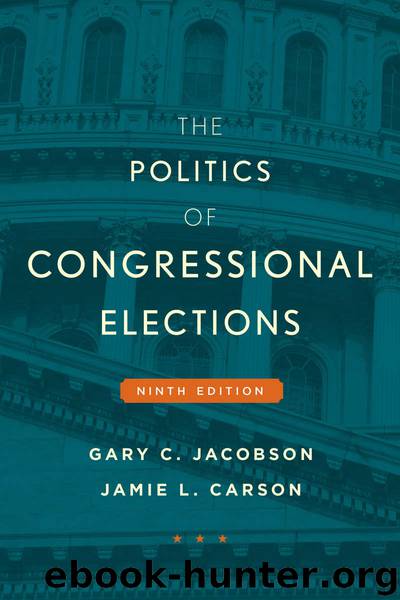The Politics of Congressional Elections by Gary C. Jacobson & Jamie L. Carson

Author:Gary C. Jacobson & Jamie L. Carson [Jacobson, Gary C.]
Language: eng
Format: epub
ISBN: 9781442252639
Publisher: Rowman & Littlefield Publishers
Published: 2015-12-16T08:00:00+00:00
Source: ANES.
PARTISANSHIP AND INCUMBENCY
Changes in the incidence of party-line voting contributed directly to the rise and subsequent decline in the congressional incumbency advantage discussed in chapter 3. Challengers’ partisans have always been more inclined to defect to incumbents than have incumbents’ partisans to challengers (or candidates for open seats), but the incidence of such defections rose in the 1960s and 1970s to remarkably high levels (figures 5.6 and 5.7). Changes in the wording of the vote choice question exaggerated these estimates beginning in 1978 (it was revised again to reduce the exaggeration after 1998),29 but even with that caveat, it is obvious that the decline in party loyalty strongly favored incumbents, contributing to their growing electoral advantage. It is also evident that the revival of party loyalty in recent elections registers mainly as a decrease in partisan defections to incumbents, which in the 2008 and 2012 ANES studies were at levels lower than at any time since the 1950s. Data from Senate elections display the same trends, although Senate incumbents’ advantage in defections is consistently smaller than that of House incumbents. Defections to challengers among voters sharing the incumbent’s party affiliation have always been comparatively rare, but they, too, have declined significantly since the 1970s.
Figures 5.6 and 5.7 display, at the level of individual voters, the changes in the vote advantage of House and Senate incumbents found in the aggregate data examined in chapter 3 (figure 3.1) and confirm that incumbency, though still a net asset in appealing to voters, is a considerably less valuable one now than it was in the 1970s and 1980s. The data also reveal enduring House-Senate differences in this regard: the balance of partisan defections is always more favorable to representatives (about 5:1) than to senators (about 2.5:1). Neither phenomenon is self-explanatory. As Albert Cover pointed out in his study of the initial rise in the incumbency advantage, there is no logical reason why weaker party loyalty could not produce defections balanced between incumbents and challengers or even favoring the latter.30 Similarly, there is no logical reason why the incidence of defection should be less favorable to incumbent senators than to representatives. Other factors must be involved, and one such factor is unquestionably information.
Figure 5.6 Partisan Voters Defecting to Incumbents and Challengers in House Elections, 1956–2014
Download
This site does not store any files on its server. We only index and link to content provided by other sites. Please contact the content providers to delete copyright contents if any and email us, we'll remove relevant links or contents immediately.
The Secret History by Donna Tartt(18973)
The Social Justice Warrior Handbook by Lisa De Pasquale(12172)
Thirteen Reasons Why by Jay Asher(8858)
This Is How You Lose Her by Junot Diaz(6845)
Weapons of Math Destruction by Cathy O'Neil(6229)
Zero to One by Peter Thiel(5743)
Beartown by Fredrik Backman(5691)
The Myth of the Strong Leader by Archie Brown(5474)
The Fire Next Time by James Baldwin(5398)
How Democracies Die by Steven Levitsky & Daniel Ziblatt(5183)
Promise Me, Dad by Joe Biden(5120)
Stone's Rules by Roger Stone(5060)
A Higher Loyalty: Truth, Lies, and Leadership by James Comey(4923)
100 Deadly Skills by Clint Emerson(4888)
Rise and Kill First by Ronen Bergman(4747)
Secrecy World by Jake Bernstein(4712)
The David Icke Guide to the Global Conspiracy (and how to end it) by David Icke(4664)
The Farm by Tom Rob Smith(4475)
The Doomsday Machine by Daniel Ellsberg(4463)
